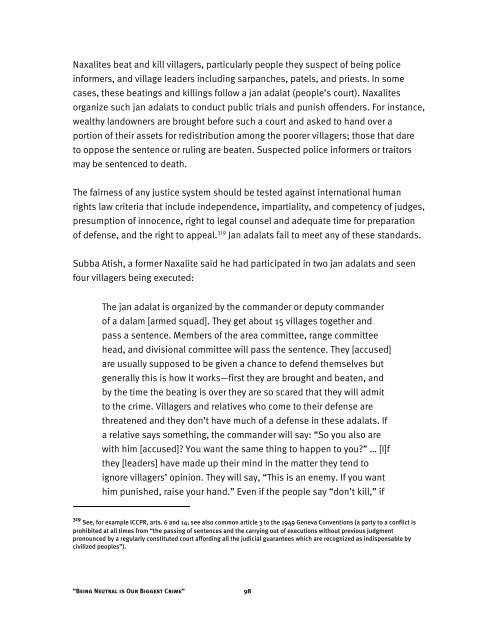âBeing Neutral is Our Biggest Crimeâ - Global Coalition to Protect ...
âBeing Neutral is Our Biggest Crimeâ - Global Coalition to Protect ...
âBeing Neutral is Our Biggest Crimeâ - Global Coalition to Protect ...
Create successful ePaper yourself
Turn your PDF publications into a flip-book with our unique Google optimized e-Paper software.
Naxalites beat and kill villagers, particularly people they suspect of being police<br />
informers, and village leaders including sarpanches, patels, and priests. In some<br />
cases, these beatings and killings follow a jan adalat (people’s court). Naxalites<br />
organize such jan adalats <strong>to</strong> conduct public trials and pun<strong>is</strong>h offenders. For instance,<br />
wealthy landowners are brought before such a court and asked <strong>to</strong> hand over a<br />
portion of their assets for red<strong>is</strong>tribution among the poorer villagers; those that dare<br />
<strong>to</strong> oppose the sentence or ruling are beaten. Suspected police informers or trai<strong>to</strong>rs<br />
may be sentenced <strong>to</strong> death.<br />
The fairness of any justice system should be tested against international human<br />
rights law criteria that include independence, impartiality, and competency of judges,<br />
presumption of innocence, right <strong>to</strong> legal counsel and adequate time for preparation<br />
of defense, and the right <strong>to</strong> appeal. 319 Jan adalats fail <strong>to</strong> meet any of these standards.<br />
Subba At<strong>is</strong>h, a former Naxalite said he had participated in two jan adalats and seen<br />
four villagers being executed:<br />
The jan adalat <strong>is</strong> organized by the commander or deputy commander<br />
of a dalam [armed squad]. They get about 15 villages <strong>to</strong>gether and<br />
pass a sentence. Members of the area committee, range committee<br />
head, and div<strong>is</strong>ional committee will pass the sentence. They [accused]<br />
are usually supposed <strong>to</strong> be given a chance <strong>to</strong> defend themselves but<br />
generally th<strong>is</strong> <strong>is</strong> how it works—first they are brought and beaten, and<br />
by the time the beating <strong>is</strong> over they are so scared that they will admit<br />
<strong>to</strong> the crime. Villagers and relatives who come <strong>to</strong> their defense are<br />
threatened and they don’t have much of a defense in these adalats. If<br />
a relative says something, the commander will say: “So you also are<br />
with him [accused]? You want the same thing <strong>to</strong> happen <strong>to</strong> you?” … [I]f<br />
they [leaders] have made up their mind in the matter they tend <strong>to</strong><br />
ignore villagers’ opinion. They will say, “Th<strong>is</strong> <strong>is</strong> an enemy. If you want<br />
him pun<strong>is</strong>hed, ra<strong>is</strong>e your hand.” Even if the people say “don’t kill,” if<br />
319 See, for example ICCPR, arts. 6 and 14; see also common article 3 <strong>to</strong> the 1949 Geneva Conventions (a party <strong>to</strong> a conflict <strong>is</strong><br />
prohibited at all times from “the passing of sentences and the carrying out of executions without previous judgment<br />
pronounced by a regularly constituted court affording all the judicial guarantees which are recognized as ind<strong>is</strong>pensable by<br />
civilized peoples”).<br />
“Being <strong>Neutral</strong> <strong>is</strong> <strong>Our</strong> <strong>Biggest</strong> Crime” 98
















